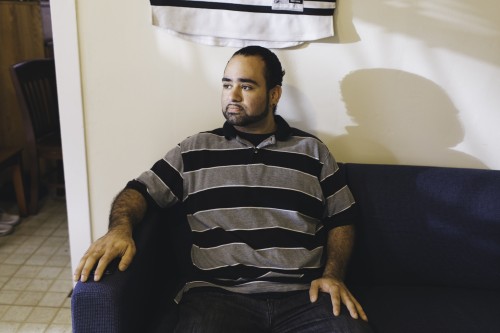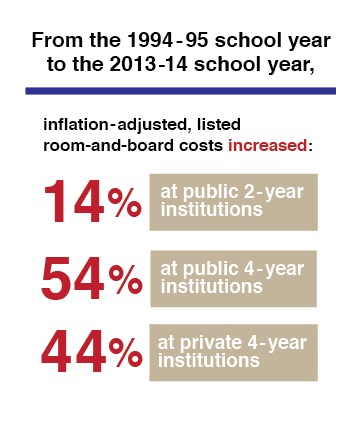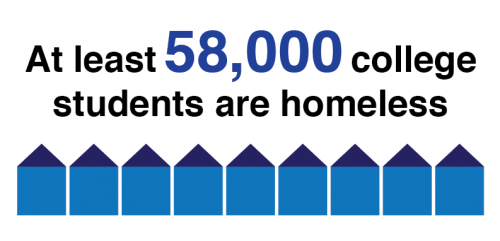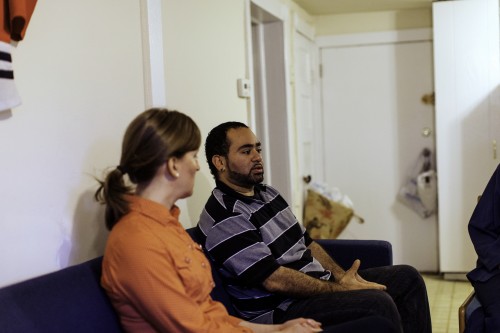
[dropcap]L[/dropcap]ast spring, 28-year-old DePaul senior Tony Romero sat on a bench outside the Loop Campus DePaul Center and wondered where he was going to sleep that night. He had lost his UPASS and had just gotten into a fight with his aunt that morning.
With nowhere to go and no way to get there, Romero fell asleep on the cold, hard, wooden benches. A campus public safety officer told him he had to get off DePaul’s campus, so he got up and thought of another plan for the night.
He asked a stranger at the train station if they would pay for his fare so he could have a spot to sleep. After some convincing, Romero was able to travel on the trains throughout the night, riding from station to station, waiting until the next day came.
Romero is one of thousands of college students suffering from housing insecurity, the lack of a stable and healthy housing arrangement. Prior to this year, he had lived in a family-owned home all of his life.
He never thought that one day he would be sleeping on trains, benches and couches.
 Today, Romero is the first DePaul student to utilize the Dax Host-Home program for DePaul University students, a temporary housing program that houses students for up to 12 weeks.
Today, Romero is the first DePaul student to utilize the Dax Host-Home program for DePaul University students, a temporary housing program that houses students for up to 12 weeks.
Before reaching out to DePaul, Romero struggled to support his family. Eventually circumstances made it so that he needed a stable place to live.
The oldest of his three siblings, Romero worked after high school for five years, trying to support himself and his family until deciding to go back to school. Romero attended Wilbur Wright College, City Colleges of Chicago and after two years he received his associate’s degree in business administration.
During his time at Wilbur Wright, Romero realized his educational aspirations spanned larger than what the institution could offer him. He wanted to major in accounting at a university, but he wasn’t sure which school he wanted to attend. It took another year before he applied and was admitted to DePaul in the fall of 2013.
Romero said DePaul gave him an opportunity to succeed and prosper more than he thought possible.
“It was definitely a different scenery from what I’ve seen before,” Romero said. “I knew that if I ever completed there, and if I ever got through it, I would be further in my life than where I am now.”
As Romero was pursuing his education, his housing situation took a drastic turn.
“This year is when it all fell apart,” Romero said. “We lost the family and the home, and the owner of the house, which is my uncle, the brother of my grandparents, basically said that we all had to leave.”
For about five months, Romero resided with an aunt. He slept on a couch in the basement, leaving early in the morning and staying at school late into the night. His choice to go to school instead of work created tension with his aunt.
“I was just sleeping on a couch in the basement. It wasn’t a home, it didn’t feel like home.” Romero said.
Family conflict, combined with the recent loss of his home, led Romero to the brink of homelessness every night.
He finally sought help.
After spending the night on the train, Romero went to the Deans of Students Office and that is when Shenay Bridges, assistant dean of Community Resources, introduced him to the Dax Host-Home program.
For the last year and a half, Bridges’ primary task has been dealing with students’ housing insecurities. Bridges works with students facing emergency situations that may impact their success at DePaul and gives students advice, makes referrals to internal and external resources students may need and is an overall advocate for issues that students may face.
While Romero is the first student to receive temporary housing, Bridges said student homelessness is an issue across the nation.
According to the U.S. Department of Housing and Urban Development, at least 58,000 college students are homeless. Student homelessness is attributed to unaffordable housing options near campus, with the cost of living oftentimes exceeding the cost of tuition at the institution. In Chicago where rent prices are particularly high, students are especially prone to facing housing insecurity.
“In college towns, there might be a greater variety of lower rent options because they know they’re catering to a college student population, where in the city of Chicago, you don’t have that, everybody is looking to find housing all over the city,” Bridges said. “Any urban environment where you have a lot of universities is going to have the risk of not having students who are able to afford the high rent and are struggling to make ends meet.”
Bridges said housing insecurity is a national problem going under the radar at many universities.
“A lot of people don’t think of college students as having this problem, they think, ‘oh they live in the residence halls’ or they have these apartments and they’re living the college life,” Bridges said. “Someone who is homeless or housing insecure doesn’t really register.”
Bridges also serves as a counselor to students facing these issues and speaks to students about available resources.
“One of my roles is to explore with students all of their options, I think a lot of the times students may not be necessarily aware of the resources available to them,” Bridges said. “It’s hard for students to have to ask for help, particularly when the topic is around being under resourced or not being able to afford things. That’s a sensitive topic for a lot of students, so a lot of times it takes a lot to be willing to ask for help.”
The Dax Host-Home program, named after the city where St. Vincent DePaul went to college, is a resource offered for students looking for help. This program was created by DePaul USA, a national homelessness organization.
President and Executive Director of DePaul USA Chuck Levesque wanted to partner with DePaul in order to respond to the growing number of students, specifically at DePaul, who were facing issues with housing insecurity.
“We knew that there were youth that were suffering from being homeless, and it was a surprise to me that they were university students,” Levesque said. “The fact that there’s so many students that are housing insecure is impacting the percentage of kids that finish college timely and so, reading that and hearing stories that Shenay told us really drew us to help our own community”
 Levesque estimates as many as 50 DePaul students who reached out to DePaul last year were on the cusp of having to leave home or homeless.
Levesque estimates as many as 50 DePaul students who reached out to DePaul last year were on the cusp of having to leave home or homeless.
Though DePaul USA is not directly affiliated with DePaul University, it is a part of the Vincentian Family and coincides with the University’s Vincentian values.
Over the 12 weeks that students participate in the program, they also receive a case worker to help them find future housing. They also aid the student with drafting a resume or searching for a job in addition to overall support.
“The whole program is designed to honor that commitment to school and create an environment where they continue to go to school. We believe that if they stay in school, they will make it, they will not be chronically homeless, they will have life achievement, they will have personal satisfaction and a job, the idea is to create a stable environment.” Levesque said.
In order for students to be considered for the program, the student must first be referred to Bridges who makes an assessment and evaluates if the student would benefit from the program. If appropriate, DePaul USA finds a host family to host the student. Levesque said they aim to accommodate up to five students at one given time.
“The student and the potential host family sit down together and see if they get along, like each other, and want to do this,” Levesque said. “Then we do criminal background checks and then place.”
Romero’s case was different in that he does not live with a host family but rather lives in an apartment that was donated to DePaul USA. DePaul USA pays a small amount for the apartment as well as covers the cost of utilities.
Romero moved into the apartment about a month after first speaking to Bridges. Members of the Vincentian family raised money to equip the apartment and threw him an apartment shower. The university also provided the space with furniture such as a couch and a table.
Levesque said DePaul USA is currently in the process of finding host families and has about three families in the neighborhood that are waiting to house students in need.
Though DePaul USA relies on community affinity to attract host families, finding families to commit to 12-week housing periods has still proven to be difficult.
“We selected 12 weeks because we thought well that’s the minimum that we’d need to finish the semester, you don’t want to uproot them in the middle of the semester or during finals,” Levesque said. “Asking someone to let someone into your house, it’s a big ask, so we thought that that made it a bite-size piece for the families, but the struggle is going to be, is that really enough time?”
Romero’s current goal is to find a job that will allow him to increase his financial means and find an apartment for the long term.

“I don’t know how many applications I put out there a week, a day, and there’s just nothing coming in,” Romero said. “That part is the hardest because every day I just think, man I just want to quit school, go work my two jobs and make my money and that’s it, I’ll survive out of that. But in reality, in the long term I’ll probably end up in the same spot again, that’s where the education comes in. That’s where the positive side comes in, knowing that in the future I’m going to have something.”
Romero said it’s a continuous struggle whether he should even be in school given his housing situation. Romero is on his first extension to continue to live in his apartment for another 12 weeks.
“Sometimes I feel like I don’t even belong there, or I shouldn’t be there, there’s times where I’m not even involved in class and just do what I got to do and that’s it,” Romero said. “It happens almost every day that I feel like that…this opportunity with this program has kind of decreased that a little bit, but it’s still there, the emotions, the struggles, it’s all still there. I have to really fight for myself to sit in that class and feel comfortable around everybody else.”
In the future, Levesque wants to solidify the Dax Host-Home program at DePaul and increase their presence. He also hopes to expand the program through more host homes and some day have a house to serve as transitional housing for a larger group of youth as well.
Both Romero and Bridges want more students who may be facing potential homelessness to learn what resources are available and to erase the stigma and shame behind housing insecurities.
“There’s a lot of emotions that come to you as you’re going through this and that’s one of the biggest struggles you have to get over and overcome,” Romero said. ”Just look back at the positive side and I just think that once I do finish this, that I am going to be able to be somewhere better in my life, and that’s the only thing that keeps me going forward.”
“Going to school is the only thing that keeps me going forward, otherwise I don’t know where I’d be right now.”



